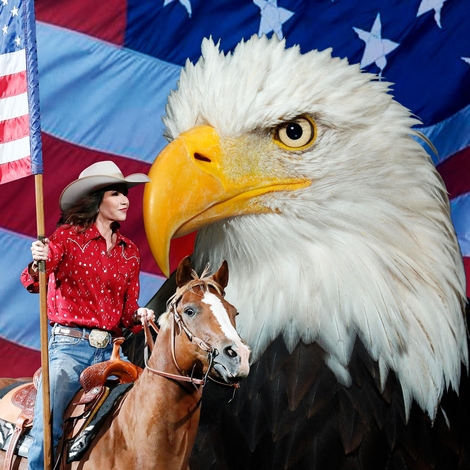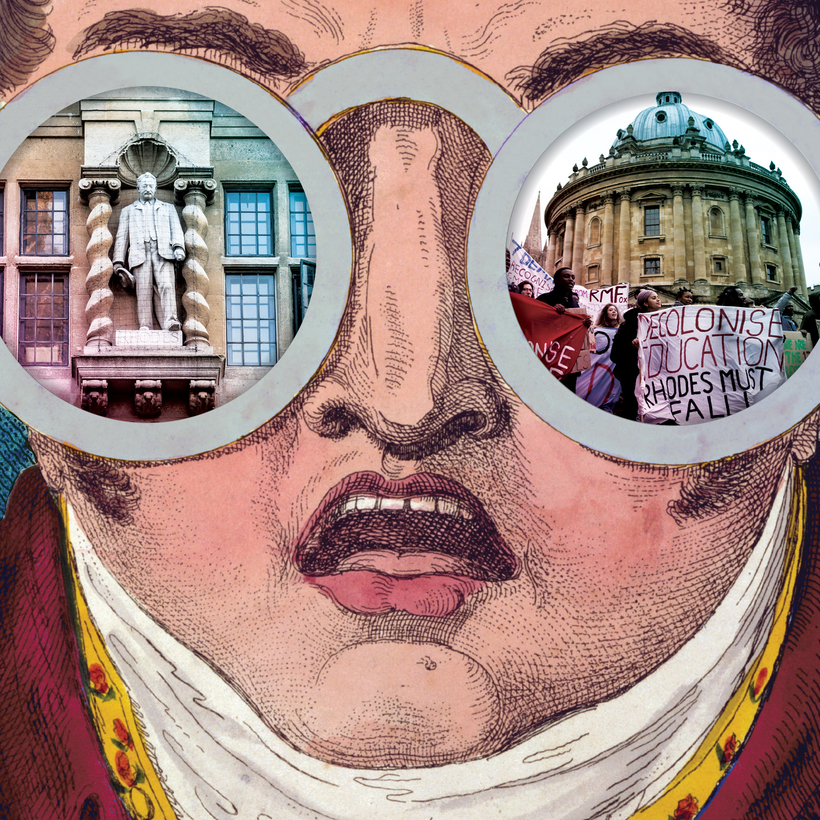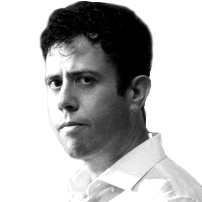During my junior year at Yale, I decided to apply for a Rhodes Scholarship. Awarded annually to 32 Americans, the Rhodes provides full funding for graduate study at Oxford University. Robert Penn Warren, Bill Clinton, Kris Kristofferson, Terrence Malick, Susan Rice, Rachel Maddow, and Pete Buttigieg are among its alumni.
Two years earlier, in 2002, the selection of a Yale senior named Chesa Boudin had made the front page of The New York Times. Titled “From a Radical Background, a Rhodes Scholar Emerges,” the article detailed Boudin’s highly unusual life story. When he was 14 months old, his parents, both former members of the Weather Underground, were incarcerated for their role in a 1981 Brink’s heist in Nyack, New York, that left a security guard and two police officers dead, one of whom was the first Black cop on the force. Boudin was raised by Bill Ayers and Bernardine Dohrn, onetime leaders of the Weather Underground—the latter an alumna of the F.B.I.’s Ten Most Wanted List. “My parents were all dedicated to fighting U.S. imperialism around the world,” Boudin told The New York Times. “I’m dedicated to the same thing.”

Boudin’s radical pedigree and left-wing politics were said to represent a new type of Rhodes scholar. “Once an exclusive club of Ivy League athletes,” the paper enthused, “the Rhodes in recent years has rewarded an array of students who have overcome striking challenges.” Boudin would later go on to work as a translator for Venezuelan strongman Hugo Chavez, and was elected San Francisco district attorney in 2020—only to be recalled in 2022 after voters grew disenchanted with his soft approach to crime.
The first person I consulted about my Rhodes application was Charles Hill, a diplomat-in-residence at Yale and former executive aide to Henry Kissinger and George Shultz. I asked Hill if it would be worth applying for the Rhodes. “Doubtful, Jamie,” he said. That I was gay (a plus, by that point, for the Rhodes selection committee) would be outweighed by my lack of progressive credentials (a definite minus). Moreover, he noted, I had “never spent a summer singing love poetry to Chechen refugees.”
Against Hill’s typically wise advice, I met with Yale’s fellowships adviser the following semester. I needed to come up with a better “narrative” about myself, he said. Lacking the discretion and tact that I have (hopefully) since acquired, I blurted out, “Well, that may be difficult, as my parents didn’t kill anyone.”
“Chesa earned the Rhodes entirely by himself,” he responded coolly.
To no one’s surprise but mine, Yale did not endorse my application.
Two recent news items suggest that experiences like mine were a harbinger of things to come. There was Harvard’s decision to withhold diplomas from two Rhodes recipients for partaking in an anti-Israel encampment this spring. And earlier this month, a study by the American Enterprise Institute found that, among the 157 Rhodes scholars selected over the past five years, just one “expressed interest in a right-leaning issue in their program biography.”
The increasingly left-wing tilt of the Rhodes Scholarship has provoked outrage from a number of concerned alumni. Led by a former director of national intelligence from the Obama administration, they are opposed to what they perceive as the program’s abandonment of academic excellence in favor of identity and victimhood. This heated, transatlantic, epistolary war—waged in newspapers, open letters, and jeremiads in the scholarship’s typically dry, tri-annual journal, The American Oxonian—has unleashed accusations of racism, avarice, and ideological conformity among this hitherto collegial community. Yet both sides seem to agree on one thing: nothing less than the fate of the Western world is at risk.
“Going Down”
In his last will and testament, British industrialist Cecil John Rhodes set out four criteria for selecting the beneficiaries of his eponymous scholarship, which he had endowed so that they “fight the world’s fight”:
“His literary and scholastic attainments;
“His fondness of and success in manly outdoor sports such as cricket, football and the like;
“His qualities of manhood, truth, courage, devotion to duty, sympathy for the protection of the weak, kindliness, unselfishness, and fellowship;
“His exhibition during school days of moral force of character and of instincts to lead and to take an interest in his schoolmates for those latter attributes will be likely in after-life to guide him to esteem the performance of public duty as his highest aim.”
Rhodes also stipulated that “no student shall be qualified or disqualified for election to a Scholarship on account of his race or religious opinions,” a policy that was highly unusual for its day, all the more so given Rhodes’s, shall we say, archaic views on race. That said, recipients were almost exclusively white until the 1970s; women were not even eligible to apply until 1977, by an act of Parliament.
The war of the “Rhodies” began in 2016, when a group of Oxford students adopting the rallying cry “Rhodes Must Go” began pushing to have a statue of Rhodes overlooking the High (Main) Street taken down. After a group of alumni threatened to withhold more than $100 million in donations, Oxford’s Oriel College, where the statue was located, announced that it would remain. By this point, Rhodes scholars had ended the century-long tradition of toasting Rhodes at their annual “Going Down Dinner.”
Beginning in 2018, alumni of the program noticed something unusual: press releases from the scholarship’s governing body, the Rhodes Trust, began trumpeting the racial, gender, and sexual identities of the winners. The 2020 announcement boasted that “twenty-one of the 32 are students of color; ten are Black, equal to the greatest number ever elected in one year in the United States. Fifteen are first-generation Americans or immigrants; and one is a Dreamer with active DACA status. Seventeen of the winners are women … and one is nonbinary.”
I needed to come up with a better “narrative” about myself, the adviser said. I blurted out, “Well, that may be difficult, as my parents didn’t kill anyone.”
In May 2021, Russia expert David Satter (Illinois and Balliol ’68; in official Rhodes Scholarship communications, alumni are identified by their home state, the Oxford college they attended, and the year of their incoming class) published an op-ed in The Wall Street Journal alleging that the scholarship was betraying its purpose. Whereas previous generations “studied Arabic and Chinese and became respected experts in their fields,” he wrote, recent recipients were “praised not for worldliness but for their demographics.”
Taking to the pages of the American Oxonian, the scholarship’s C.E.O., warden of Rhodes House Elizabeth Kiss (Virginia and Balliol ’83), stated that Satter harbored “racial biases,” made “false, misinformed” claims, and asserted that “all of our scholars are chosen solely for their individual excellence.”
It was out of this dispute that, in 2022, the Alliance of Rhodes Scholars was born. Led by Satter and his Rhodes classmate Dennis Blair (Virginia and Worcester ’68), a career naval officer and director of national intelligence under Obama, the pair recruited half their class—its best-known alum, Bill Clinton (Arkansas and University ’68), not among them—to the cause. “The drive to introduce elements of currently fashionable woke ideology into the operations of the scholarship can only destroy its authority,” they declared.
In a report submitted to the Rhodes Trust in early 2023, the group listed a series of concerns. First was the “reduction to mush” of the scholarship’s hortatory motto, “Fight the world’s fight,” which the trust had replaced with the fuzzier “Stand up for the world.” The trust’s newfangled description of Rhodes scholars as people “who are impatient with the way things are and have the courage to act,” it was observed, “can apply to saints and fanatics alike.”
The group also condemned the recruitment of scholars from such authoritarian countries as China and Saudi Arabia, a policy that it claimed had been undertaken—much like the renting out of Rhodes House for weddings and other private events—for financial gain. Finally, the report condemned the replacement of the athletic requirement with a vague stipulation that scholars demonstrate “energy to use one’s talents to the full,” and the substitution of the call to public service with “moral force of character and instincts to lead, and to take an interest in one’s fellow beings.”
In response, Kiss and John Bell (Alberta and Magdalen ’75), the chairman of the trust, averred that the Rhodes had “taken the lead among scholarship programs in identifying the problem of a growing prevalence of ‘trauma narratives’ in personal statements” and was “making changes to our application form to discourage them.” They flatly denied, however, that “preference is granted on grounds of gender, ethnicity or race.” And they defended the inclusion of students from countries with authoritarian governments as it is “critical for a scholarship focused on developing leaders for a better world.”
The group was unpersuaded. In a letter to Kiss and Bell, Blair related how he’d logged on to ChatGPT and told it to “write a personal essay for a Rhodes scholarship application.” The artificial-intelligence platform dutifully produced “a short essay emphasizing victimhood and ‘passion for advocating for marginalized communities,’” he wrote.
In a speech last year at Oxford, delivered during a side event to the 125th-anniversary celebration of the scholarship, Satter drew an eyebrow-raising comparison between the Russian Revolution and the current “victim culture [that] is now the Rhodes Scholarship’s animating philosophy.” Out of a legitimate concern for the condition of Russian serfdom, he said, “fanatics acting in the name of the oppressed proceeded to inflict a holocaust on the entire population.”
Whereas previous generations “studied Arabic and Chinese and became respected experts in their fields,” Satter wrote, recent recipients were “praised not for worldliness but for their demographics.”
Some former Rhodes scholars, even those sympathetic to the aims of the alliance, say that the scholarship is downstream from broader cultural phenomena and that it’s therefore unreasonable to expect it to remain unaffected by these societal trends. Women, for instance, constitute 60 percent of college graduates, and the higher representation of women Rhodes scholars might simply reflect this development rather than an effort to deprioritize men.
“If the selection committee can only choose among woke kids, maybe they’re choosing among the best of them,” a member of the class of 1986 told me. “It may not be that the criteria has changed. It may be that the applicant pool has changed.” This self-described “extremely conservative” alum finds the alliance—founded by an all-male class—“a bit intolerant. They have a very particular conception of what ‘the world’s fight’ is. I think they have an intolerance for how other people conceive that.”
The evolving face of the Rhodes Scholarship might simply be a reflection of the political journalist John O’Sullivan’s First Law: “All organizations that are not actually right-wing will over time become left-wing.” Or maybe the changes are just surface level. Rhodes scholars have long had a reputation for being obsequious careerists, transforming themselves into whatever the elite consensus of the day deems worthy. Writing nearly four decades ago in Spy, a young Andrew Sullivan, fresh from Oxford, described Rhodes scholars as “misfits by virtue of their bland eugenic perfection.”
“While there are some extraordinary scholars,” a member of the class of 1998 told me, “others tend to be pretty boring and go off to a university or practice law. You don’t find a lot of mavericks or iconoclasts or entrepreneurs.” And when iconoclasts do emerge, in the literal form of Rhodes scholars demanding that a statue of the man whose munificence and foresight funded their ticket into the global elite be taken down? “There’s a bit of hypocrisy in wanting to latch onto the prestige of what this man founded while also hating him,” says a member of the class of 2005.
While the program may have undergone some dramatic changes over the past few years, one thing remains the same. A Rhodes scholar, as the saying goes, is still “a young man with a bright future behind him.”
James Kirchick is a Writer at Large at AIR MAIL and the author of Secret City: The Hidden History of Gay Washington


